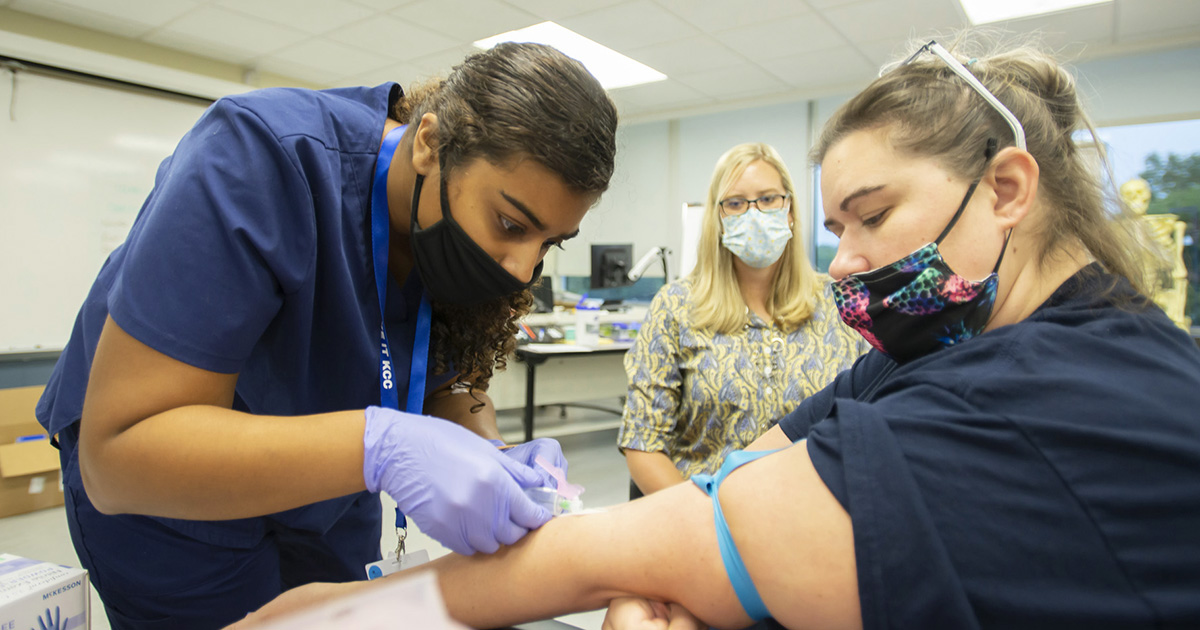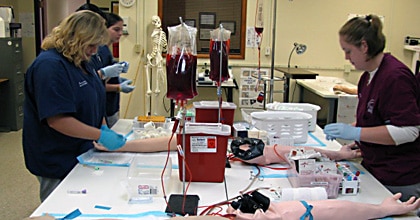Phlebotomy Training Course Costs Explained: Ways to Save
Phlebotomy Training Course Costs Explained: Ways to Save
Blog Article
The Path to Qualification: Comprehending the Phlebotomy Training Program Journey and Its Value
As you take into consideration the course to qualification in phlebotomy, it's crucial to comprehend the duty you'll play in health care. Your training will cover important skills, from blood collection strategies to patient interaction.

The Duty of Phlebotomists in Healthcare
Phlebotomists play a vital role in the healthcare system, acting as the vital web link in between patients and essential diagnostic screening. You'll execute blood attracts, guaranteeing samples are collected precisely and safely. Your know-how aids in identifying clinical problems, keeping track of wellness, and directing treatment decisions.
In your daily interactions, you'll require to establish count on with individuals, making them feel comfy throughout what could be a demanding experience. You're responsible for labeling and taking care of examples carefully to protect against contamination or errors, which can affect examination outcomes.
Past this, you'll typically function alongside physicians and registered nurses, interacting critical info concerning patients' problems. Your function is basic in preserving the process in healthcare setups, making sure timely and precise outcomes. By mastering your skills, you contribute meaningfully to person treatment, making you an important part of the medical team. Accepting this duty is vital to your success as a phlebotomist.
Overview of Phlebotomy Training Programs
When exploring phlebotomy training programs, you'll find different kinds made to fit various schedules and learning designs. Each program assists you establish essential skills like blood collection and client interaction. Comprehending these alternatives is essential to picking the right course for your occupation.
Kinds Of Educating Programs
Numerous types of training programs are readily available for those looking to come to be efficient in phlebotomy. Furthermore, some medical facilities and centers offer on-the-job training programs, supplying practical experience while you discover. Whatever path you choose, each program aims to outfit you with the needed skills for an effective phlebotomy career.

Key Skills Developed
Grasping phlebotomy needs a set of crucial skills that are established via detailed training programs. You'll discover technological skills like correct vein option, needle insertion, and blood collection strategies. These hands-on techniques ensure you can execute treatments safely and efficiently. In addition, communication skills are essential; you'll require to engage with people, discuss treatments, and placed them comfortable. Recognizing composition and physiology is important, too, as it helps you situate veins and comprehend the body's response to blood attracts. Ultimately, you'll gain understanding of safety protocols and infection control, guaranteeing you maintain a clean and sterile setting. Each of these abilities is necessary for your success as a licensed phlebotomist, making you an important possession in any kind of health care setup.
Secret Parts of a Phlebotomy Program
In a phlebotomy training course, you'll concentrate on vital subjects that prepared for your future job. You'll engage in hands-on training that permits you to use what you have actually found out in real-world settings. Both the curriculum and functional experience are essential for your success as a phlebotomist.
Curriculum Summary
While pursuing a phlebotomy training course, you'll come across a core curriculum designed to equip you with fundamental skills and expertise. Phlebotomy school. This curriculum typically consists of anatomy and physiology, concentrating on the circulatory system and understanding blood elements. You'll additionally discover various kinds of blood collection techniques, including venipuncture and capillary slit strategies
Additionally, infection control and safety procedures are vital parts, guaranteeing you understand exactly how to preserve a clean and sterile atmosphere. You'll examine patient interaction, emphasizing interaction and empathy, which are crucial for alleviating individual anxiety.
Hands-On Training Experience
Obtaining hands-on experience is an important component of your phlebotomy training program. This sensible training permits you to apply what you've discovered in a real-world setting, improving your skills and confidence. Phlebotomy school.
Additionally, you'll obtain the opportunity to interact with individuals, which is necessary for creating your communication skills. This mix of technical efficiency and interpersonal abilities is essential for your success as a licensed phlebotomist. Eventually, hands-on training is where theory satisfies technique, solidifying your expertise and readiness for accreditation.
Accreditation and Licensing Requirements
Before you can begin your career in phlebotomy, it is crucial to understand the accreditation and licensing demands that differ by state. A lot of states call for phlebotomists to hold a certification from a recognized company, such as the National Phlebotomy Association or the American Culture for Professional Pathology. These qualifications normally involve passing a test that evaluates your knowledge and skills in the area.
Along with certification, some states have details licensing requirements. You may require to complete a specific number of hours in medical practice, submit proof of training, or undergo a background check. It is necessary to research your state's laws to make certain you meet all essential criteria.
Remaining educated concerning these needs not just aids you safeguard a setting however additionally enhances your reliability as a professional. By satisfying these demands, you'll be well on your method to an effective career in phlebotomy.
Hands-On Training and Practical Experience
Hands-on training and useful experience are important components of your phlebotomy education and learning, as they allow you to use academic understanding in real-world situations. Throughout your training, you'll participate in supervised venipuncture, discover correct techniques, and become familiar with different blood collection tools. This straight participation is essential for constructing your confidence and refining your skills.
You'll work carefully with knowledgeable specialists that can direct you through the subtleties of patient communication Website and sample handling. Each practice not only strengthens your understanding however also prepares you for the hectic atmosphere of health care setups.
Furthermore, numerous programs integrate professional turnings, permitting you to experience varied settings, from healthcare facilities to outpatient clinics. This exposure assists you adapt Learn More to various challenges and individual needs, ensuring you're well-prepared for your future duty. Accept these chances, as they're important to ending up being a proficient and caring phlebotomist.
Difficulties Faced Throughout Training
While acquiring hands-on experience is crucial, it's vital to acknowledge the difficulties that can develop throughout your phlebotomy training. Furthermore, grasping the skills required for blood attracts takes practice; you may have a hard time with method initially.
Time administration can also be a difficulty, as harmonizing concept, sensible sessions, and personal commitments can really feel intimidating. You may face varying discovering paces amongst your peers, leading to feelings of insecurity if you think you're falling behind. Adjusting to the various characters of teachers can be challenging, as each may have an one-of-a-kind teaching design.
Recognizing these challenges early can prepare you for success and assist you create durability throughout your training journey.
Job Opportunities After Certification

As you get experience, you might even take into consideration focusing on locations like pediatric or geriatric phlebotomy, accommodating specific patient requirements. Some phlebotomists pick to progress their occupations by ending up being research laboratory technicians or going after more education and learning in medical care fields.
Furthermore, your qualification can lead to roles in training or overseeing new phlebotomists, enabling you to share your understanding. With the healthcare market constantly growing, your abilities will always be in demand, leading the way for a stable and fulfilling job. Embrace the chances waiting for you!
Frequently Asked Questions
What Is the Common Period of a Phlebotomy Training Course?
Phlebotomy training courses usually last around 4 to eight weeks. You'll take part in hands-on technique, class guideline, and on-line knowing. Finishing this training prepares you for certification and a fulfilling job in health care.
Are Online Phlebotomy Courses Available?
Yes, online phlebotomy programs are offered. They offer versatility and ease, enabling you to examine at your own rate. Just confirm the program is certified to fulfill qualification demands and acquire important skills for your occupation.
Just How Much Does Phlebotomy Training Usually Expense?
Phlebotomy training generally costs in between $700 and $2,500, depending on the program and location. You need to think about elements like program size, included materials, and hands-on experience when choosing the appropriate training for you.
What Are Usual Prerequisites for Phlebotomy Training?
Common prerequisites for phlebotomy training often consist of a high college diploma or GED, booster shots, and a background check. Some programs may this content additionally need fundamental health care knowledge or accreditations, ensuring you're gotten ready for hands-on training.
Can I Work While Completing My Phlebotomy Training?
Yes, you can function while finishing your phlebotomy training. Numerous pupils equilibrium jobs with their researches, yet make certain to handle your time efficiently to ensure you satisfy both job and training dedications effectively.
Report this page